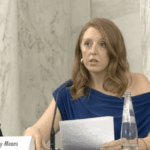Is the US slow-walking toward a monkeypox disaster?
By Matt Field | July 29, 2022
 A protest in New York City demanding the government do more to stop the spread of monkeypox. Credit: Jeenah Moon / Getty Images.
A protest in New York City demanding the government do more to stop the spread of monkeypox. Credit: Jeenah Moon / Getty Images.
In sports terms, containing monkeypox should have been like hitting a slow pitch. Compared to COVID the disease spreads less easily and experts were once optimistic that the United States could contain it. Now many worry that the government whiffed. Monkeypox could be here to stay. Leaping ahead of the federal government, San Francisco and New York state on Thursday declared emergencies as the number of domestic monkeypox cases has swelled to almost 5,000.
Compared to the outbreak of COVID-19, a brand-spanking new-to-humans respiratory disease, the government should have had a much easier time halting monkeypox in its tracks. The viral disease was first discovered in people 1970 and has been endemic for decades in Africa. And unlike COVID, effective vaccines already existed when the current outbreak began. Monkeypox transmission generally requires prolonged close contact. Most of the cases to date have involved men who have sex with men, pointing to a route toward prioritizing vaccinations. Still experts now worry that the door to stopping monkeypox from becoming the second virus since 2020 to become endemic in the United States is closing.
“We made a lot of the same mistakes that we made with COVID, with this (outbreak)—having a very narrow case definition, not having enough testing early enough, not deploying vaccine in an aggressive fashion to ring vaccinate,” former Food and Drug Administration Commissioner Scott Gottlieb told CBS’s Face the Nation recently. “But now this is firmly embedded in the community.”
Gottlieb told CBS that monkeypox will now likely persist and occasionally cause infections outside intimate relationships.
Others have looked beyond COVID and see parallels in another government infectious disease failure, the AIDS crisis. When AIDS emerged in 1981, it was largely billed as a disease affecting gay men. Officials often ignored the burgeoning crisis: Former President Ronald Reagan didn’t say the word “AIDS” in public for four years after the first case. His press secretary appeared to make gay jokes to journalists who asked about it. At a recent protest in Manhattan, activists compared President Joe Biden to Reagan. One told The New York Times, “The quip about the ’80s is ‘the right people were dying.’” Unlike in the early 1980s, health officials now appear to be earnestly working to avoid stigma during the monkeypox response.
The government has been trying bolster testing for monkeypox and is increasing vaccine distributions to states. So far demand for vaccines is outstripping supply, however.
Although it is less deadly and transmissible than COVID, monkeypox can cause excruciating pain and can be deadly in certain people. Experts worry that it may also spread to a wider population. Already there are reports of women and children with monkeypox. As of July 25, the CDC said two children have been diagnosed. Since then, Indiana authorities reported two more children with the disease. In addition to close, intimate contact, monkeypox can also spread on infected materials like bedding.
When monkeypox cases started cropping up outside of African countries in May, many thought the United States could get ahead of the outbreak. “The country has prepared in ways that we weren’t prepared for COVID-19,” Boston University virologist John Conner told a university publication The Brink back then. “We could react in a big way.” Their optimism seems less warranted today.
Together, we make the world safer.
The Bulletin elevates expert voices above the noise. But as an independent nonprofit organization, our operations depend on the support of readers like you. Help us continue to deliver quality journalism that holds leaders accountable. Your support of our work at any level is important. In return, we promise our coverage will be understandable, influential, vigilant, solution-oriented, and fair-minded. Together we can make a difference.
Keywords: monkeypox
Topics: Biosecurity
















Once again, the effects of Capitalism on our health care system can be seen. There should be plenty of vaccine in production. Also, COVID19 vaccine patents should be released, at least to India where they can pump out a billion doses in no time.